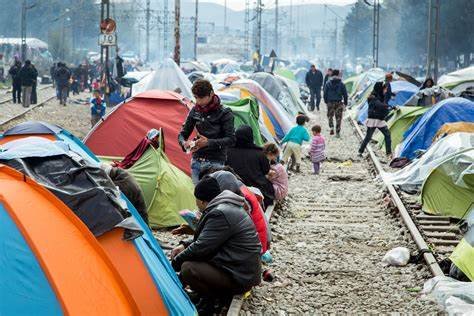The refugee crisis is one of the most pressing global challenges of our time, with millions of people fleeing violence, persecution, and poverty in search of safety and a better life. This article examines the causes, consequences, and potential solutions to the ongoing refugee crisis.
Causes:
There are many factors that contribute to the refugee crisis. Some of the most significant include armed conflict, political instability, economic inequality, and environmental degradation. For example, the civil war in Syria has displaced millions of people, while political turmoil in countries like Venezuela and Myanmar has forced many to flee their homes. In addition, climate change is increasingly becoming a factor in displacement, as rising sea levels and natural disasters make some areas uninhabitable.
Consequences:
The refugee crisis has significant consequences for both refugees and the countries that host them. Refugees often face difficult living conditions, limited access to healthcare and education, and the risk of exploitation and violence. Host countries, meanwhile, may struggle to provide adequate resources and services to refugees, and may face political and social tensions as a result of the influx of people. In addition, the refugee crisis can have broader economic and social impacts, including reduced economic growth, increased crime rates, and strained social services.
Key Players:
There are many actors involved in the refugee crisis, including governments, international organizations, and civil society groups. Some countries, such as Germany and Canada, have taken a more proactive approach to refugee resettlement, while others, such as the United States, have implemented more restrictive policies. International organizations like the United Nations High Commissioner for Refugees (UNHCR) play a critical role in providing aid and support to refugees, while civil society groups work to raise awareness and advocate for policy change. In addition, local communities and organizations in both host and origin countries can play a critical role in supporting refugees and promoting social cohesion.
Solutions:
There are no easy solutions to the refugee crisis, but there are steps that can be taken to mitigate its impact and address its root causes. Some potential solutions include:
1. Addressing the root causes of displacement: This could involve promoting peace and stability in conflict-affected countries, addressing economic inequality, and taking action to mitigate the impact of climate change. For example, countries could work to reduce their greenhouse gas emissions and provide support to communities affected by natural disasters.
2. Improving refugee resettlement policies: Countries can work to improve their refugee resettlement policies, including providing more resources and support to refugees and streamlining the resettlement process.
3. Supporting host communities: Host countries can work to provide resources and support to both refugees and the communities that host them, in order to mitigate the impact of the refugee influx and promote social cohesion.
Conclusion:
In conclusion, the refugee crisis is a complex and pressing global challenge that requires a coordinated and compassionate response from governments, international organizations, civil society groups, and local communities. By addressing the root causes of displacement, improving refugee resettlement policies, and promoting social cohesion and inclusion, we can work towards a more just and equitable world for all. It is our collective responsibility to ensure that refugees are treated with dignity and respect, and that they are given the support and resources they need to rebuild their lives and contribute to their communities. Together, we can build a brighter future for refugees and for all people affected by displacement.
